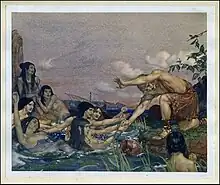Idyll XIII, sometimes called Ύλας ('Hylas'), is a bucolic poem by the 3rd-century BC Greek poet Theocritus.[1][2] As in Idyll XI, Nicias is again addressed, by way of introduction to the story of Hylas.[3] This beautiful lad, a favourite companion of Heracles, took part in the Quest of the Fleece of Gold.[3] As he went to draw water from a fountain, the water-nymphs dragged him down to their home, and Heracles, after a long and vain search, was compelled to follow the heroes of the Quest on foot to Phasis.[3]
Summary

Theocritus offers a consolatio amoris to his friend the poet-physician Nicias of Miletus, with whom he studied under the physician Erasistratus.[2] After a brief introduction by way of stage-direction, he tells him the song the Cyclops sang to his love the sea-nymph.[2]
Date
According to classicist J. M. Edmonds, metrical and grammatical considerations make it probable that the poem was an early one and it may well be anterior to Idyll XXVIII, "The Distaff".[2]
See also
References
Sources
- Mastronarde, D. J. (1968). "Theocritus' Idyll 13: Love and the Hero". Transactions and Proceedings of the American Philological Association. 99: 273–90.
Attribution: ![]() This article incorporates text from these sources, which are in the public domain.
This article incorporates text from these sources, which are in the public domain.
- Edmonds, J. M., ed. (1919). The Greek Bucolic Poets (3rd ed.). William Heinemann. pp. xix, 139–47.
- Lang, Andrew, ed. (1880). Theocritus, Bion, and Moschus. London: Macmillan and Co. pp. 53–6.
Further reading
- Cholmeley, R. J., ed. (1919). The Idylls of Theocritus (2nd ed.). London: G. Bell & Sons, Ltd. pp. 264–72.
- Gyorkos, Andrew (2015). The Rape of Hylas in Theocritus Idyll XIII and Propertius 1.20 (PDF) (Master of Arts thesis). McMaster University.
- Higham, T. F.; Bowra, C. M. (eds.). The Oxford Book of Greek Verse in Translation. Oxford: Clarendon Press. pp. 560–1, 743.
External links
 Greek Wikisource has original text related to this article: Ύλας
Greek Wikisource has original text related to this article: Ύλας Media related to Idyll XIII at Wikimedia Commons
Media related to Idyll XIII at Wikimedia Commons- "Theocritus, Idylls, ὕλας". Perseus Digital Library.